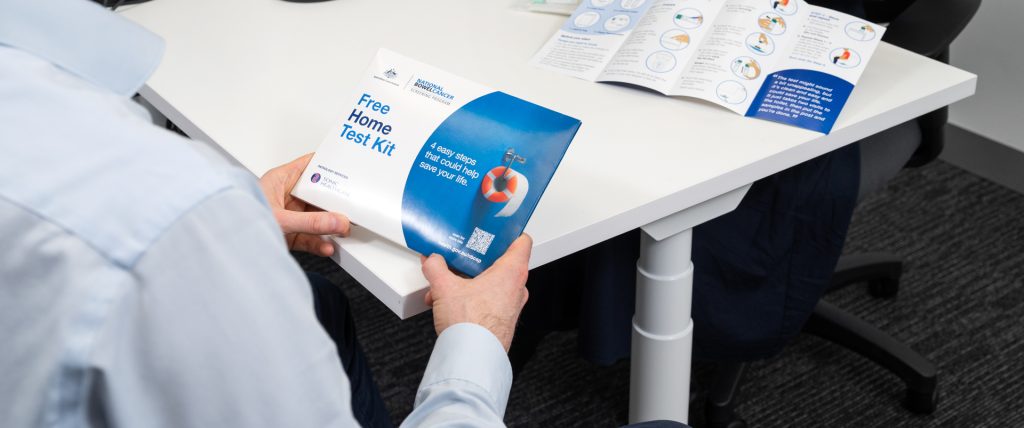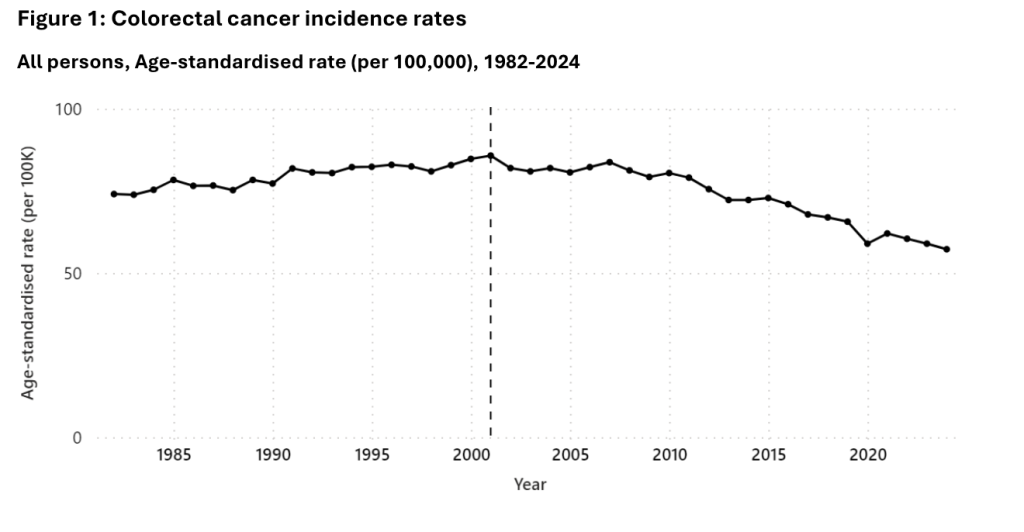Changes mean more patients can screen with the National Bowel Cancer Screening Program

Changes to the National Bowel Cancer Screening Program offers improved early detection and increased survival rates for more Australians.
Early detection and timely access to diagnostic assessment for bowel cancer are crucial to increasing equity of healthcare and improving bowel cancer incidence and outcomes for Australians.
With bowel cancer the second leading cause of cancer related deaths in Australia, the National Bowel Cancer Screening Program is calling on healthcare providers to endorse life-saving screening to their patients.

Actual data to 2020, projections for 2021-2024.
Changes to the National Bowel Cancer Screening Program:
Lowered Eligible Age for Population Screening
From 1 July 2024, the government lowered the eligible starting age of the National Bowel Cancer Screening Program from 50 to 45 years. This was off the back of the National Health and Medical Research Council endorsed updates to the Clinical practice guidelines for the prevention, early detection, and management of colorectal cancer.
This means, an additional 1.6 million Australians can do the free National bowel Cancer Screening Program test.
- People aged 45 to 49 can opt-in to the program by requesting their first free kit by submitting a webform or calling 1800 627 701.
- People aged 50 to 74 will continue to receive a kit every two years by post.
- All eligible people aged 45 to 74 can also ask their doctor about getting a kit.
Why this matters:
The program aims to reduce deaths from bowel cancer by detecting early signs of the disease. If found early, more than 90% of cases can be successfully treated. Early detection and improved survival also reduces the burden on individuals, their families and the healthcare system.
GPs can issue program kits
Under the National Bowel Cancer Screening Program’s alternative access model, GPs can bulk order kits and issue them directly to eligible patients during consultations. This is particularly useful for reaching under-screened groups and people hesitant to screen.
When a GP issues a kit to a patient, they can explain why the test is important and demonstrate how to do it.
Your Role as a GP
Encourage screening:
- Discuss the importance of screening during consultations, particularly opportunistically such as during health assessments.
- Emphasise the test is simple and non-invasive: patients collect two small samples at home and return in the post for testing.
- Issue National Bowel Cancer Screening Program kits to patients via the alternative access to kits model
- Understand the surveillance strategies outside of the program for patients with a family history or those at high risk of bowel cancer.
Follow Up on Results:
- Be ready to discuss results with patients who receive a positive test result – help them understand it does not mean they have cancer.
- Facilitate timely referrals for colonoscopy for further investigation.
Address Barriers:
- Educate patients about the simplicity, safety and privacy of the test.
- Provide reassurance and support for those who may be anxious about screening or follow-up procedures.
- Remind patients that finding bowel cancer early saves lives.
GPEx-Supported National Bowel Cancer Screening Program Learning Hub
To support healthcare professionals to understand and implement these changes into their practice, GPEx launched the National Bowel Cancer Screening Program Learning Hub on 30 June.
This free online learning hub offers:
- CPD-accredited training and events happening across Australia and online.
- Downloadable evidence-based resources and clinical guidance.
- Practical tools to improve screening participation and support for people hesitant to screen.